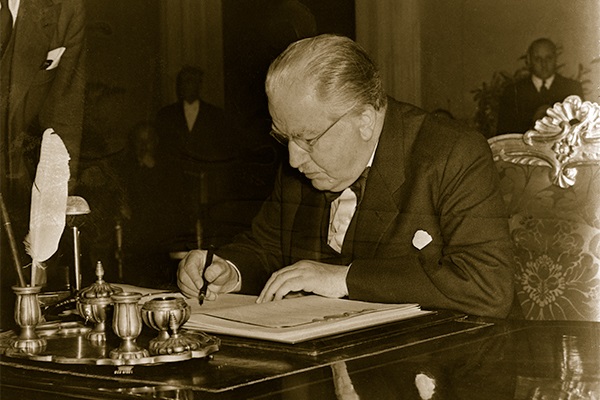 Joseph Bech, Luxembourg's then Foreign Minister, signs the Convention on 4 November 1950 in Rome;
Credit: ECHR
Joseph Bech, Luxembourg's then Foreign Minister, signs the Convention on 4 November 1950 in Rome;
Credit: ECHR
Today, Wednesday 4 November 2020, marks the 70th anniversary of the signing of the European Convention on Human Rights (ECHR); Luxembourg was the 10th Council of Europe member state to ratify the Convention.
To mark this occasion, Luxembourg's Minister of Foreign and European Affairs, Jean Asselborn, and Minister of Justice, Sam Tanson, have issued a joint declaration detailing the origins and achievements of the ECHR.
70 years ago, on 4 November 1950 in Rome, the twelve Council of Europe members at the time (including Luxembourg) signed the ECHR. The Convention was ratified and entered into force on 3 September 1953. The ECHR has since played a key role in the construction of a common legal and political culture in the 47 current member states of the Council of Europe, particularly through the binding case-law of the European Court of Human Rights (also known as the Strasbourg Court).
Luxembourg's Foreign and Justice Ministers recalled that the Strasbourg Court rulings have shaped the rights and freedoms set out in the Convention and adapted conventional standards to the development of European societies. The Convention and the Court have also accompanied the transformation of Central and Eastern European countries after the fall of the Berlin Wall and "thus contributed to the unification of our continent and the continued creation of a European area of human rights and the rule of law".
The respective ministers went on to detail the many advances made in the daily life of European citizens by the Court over the years, namely having strengthened respect for human dignity by guaranteeing the right to life, the prohibition of ill-treatment and the protection of private and family life, ensured the maintenance of a pluralist democracy by intervening in areas such as participation in free elections, freedom of expression, religion, association and assembly and non-discrimination, and promoted the rule of law, defining common standards for the administration of justice, for personal liberty and security and to protect individuals against arbitrariness and guarantee respect for the rule of law.
In Luxembourg, national legislation and administrative and judicial practices, as well as freedom of the press, were the areas most significantly impacted by the judgments of the European Court of Human Rights. The ministers recalled how the Procola, Kuhn and Leandro da Silva cases against Luxembourg with regard to Article 6 (right to a fair trial), the Saint-Paul Luxembourg SA, Roemen and Schmit cases and the Thoma v Luxembourg judgment for Article 10 (freedom of expression) left a lasting mark on the country's judicial and democratic culture.
In their capacity as Ministers of Foreign and European Affairs and of Justice respectively, Jean Asselborn and Sam Tanson seized the opportunity provided by this anniversary to reiterate their attachment to the values pillars of the conventional system, which is "today more than ever threatened by the polarisation, divisions, questioning of the rule of law and fundamental freedoms and - most recently - by the unprecedented challenges linked to the COVID-19 pandemic".
The ministers concluded that Luxembourg "will not cease to defend the maintenance and development of this legal and democratic framework from which any litigant of a member country of the Council of Europe benefits and has access". It is also in this perspective that the Grand Duchy hopes that the negotiations to allow the European Union (EU) to join the Convention can be concluded in 2021.








